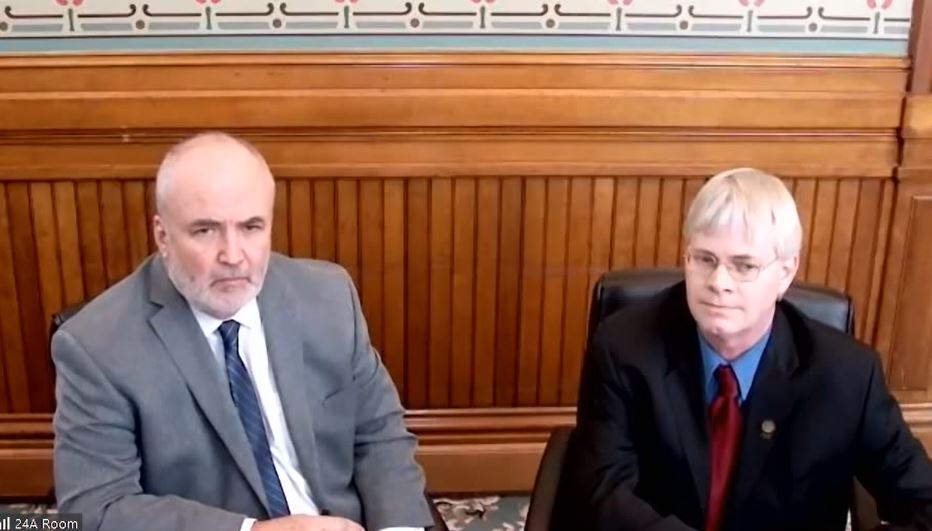A bathroom bill for Iowa elementary and secondary public and nonpublic schools advanced through an Iowa Senate subcommittee on Wednesday. The bill requires individuals to use bathrooms at the schools based on their biological sex and gender – not based on their “gender identity.”
All but one of the individuals who spoke testified against the bill. Damian Thompson, representing the GLBT Youth In Iowa Schools Task Force (Iowa “Safe Schools”) spoke against the bill. Thompson said that when gender identification was added to Iowa’s list of protected classes in 2007, it provided transgender individuals the ability to use the bathroom that aligns with their “gender identity” rather than their gender.
“In these 14 years, we’ve had zero instances of inappropriate actions happening in our school restrooms because of these accommodations,” Thompson said. “Ever. Zero.”
While Republican Sen. Jim Carlin previously shared concern about safety in bathrooms, but Thompson said this bill would instead lead to sexual assault against transgender people. He also said some transgender students will not use the restroom at all, which could lead to urinary tract infections, impacted bowels and avoiding school completely.
“Bathroom bills send the dangerous message that transgender students shouldn’t be respected, the same message that leads to bullying, harassment and violence against these exact same students,” Thompson said.
A similar bill in North Carolina led to economic damages for the state, Thompson said. The bill was repealed in the following legislative session.
Thompson said the bill violates Title IX as well.
“I urge the members of the subcommittee to oppose this harmful piece of legislation in its entirety for students, for Iowa’s well being and for what is morality right,” he said. “This bill truly represents the opposite of what it means to be Iowa nice.”
Paras Bassuk, who is a high school senior, spoke against the bill. Paras said the separation of school bathrooms on the basis of biological sex would make Iowa a less welcoming, unsafe place for transgender students.
“This bill perpetuates a culture of scrutiny towards trans youth that puts them at risk of bullying and harassment,” Bassuk said. “Separating bathrooms by biological sex would be a discriminatory mandate from the state that says we do not respect the validity of our students’ gender identities.”
Bassuk said transgender students in school bathrooms are not a threat to students.
“All students want to feel safe in the bathroom and want to feel like they’re in the correct bathroom for them,” Bassuk said.
Emily Piper of the Iowa Association of School Boards spoke against the bill. She said the bill forces schools to violate the Iowa Civil Rights Act as well as forthcoming guidance from the federal Department of Education.
“This puts us in an impossible position,” she said. “It creates a conflict of law that will be resolved over the years in the court system and so we strongly oppose this bill moving forward.”
Keenan Crow with One Iowa spoke against the bill. He said everyone should agree safety and privacy in school restrooms is “extremely important.”
“I think we can also agree that every student deserves a fair chance to succeed in school and prepare for their future, including students who are transgender,” he said. “And that every student should be treated fairly and equally under the law.”
Crow said school administrators have figured out multiple strategies for meeting the needs of students without banning transgender students from restrooms over the last 14 years.
“Now, I know for some folks, this isn’t necessarily about transgender students,” Crow said. “They’re going to point to theoretical harms of students attempting to abuse these policies. But the experience both of Iowa schools and schools across the country has shown that student abuse of these policies simply does not occur.”
Liz Lundberg, an Iowa mother, said she is the mom of a 5-year-old child who declared a year ago that “she” is really a “girl.”
“The way we talk about it in our family is when she was born, we thought she was a boy, but we made a mistake,” Lundberg said. “As soon as she was able to tell us she’s really a girl, she did. And that was about a year ago.”
Lundberg said the 5-year-old has experienced stress when dealing with parents who knew the child as a boy.
“We are so looking forward to the beginning of next school year when she will start kindergarten in a new school with new kids who will know her as herself,” Lundberg said. “The thought that her school might have to force her to use the boys’ bathroom is heartbreaking.”
Lundberg asked how the new law would be enforced and called it “unnecessary government overreach.”
“This law opens the door for all kinds of abuse and would make all of our children less safe,” Lundberg said. “It’s designed to make things especially difficult for transgender kids.”
Kristian Maul, a 39-year-old individual who identifies as a man, said highlighted a portion of the bill the individual thinks is “absurd.”
Maul spends a lot of time volunteering at the local school.
“This bill would say that I need to use the girls’ restroom when I’m there because I’m a transgender man, my birth certificate lists me as female and that is how the bill language reads,” Maul said. “So I urge you all to oppose this not just for the absurdity and discrimination and pain that it’ll cause transgender youth, but just for the fact that the language of the bill simply does not make sense and will produce results that I’m sure no one on the committee or on the public would want – a 39-year-old adult man, transgender man, such as myself using the girls’ restroom at an elementary school.”
Connie Ryan of the Interfaith Alliance of Iowa said the group stands firmly opposed the legislation. She said 2007 was a “glorious year” for civil rights when sexual orientation and gender identity were added to the Iowa Civil Rights Act.
“Anti-LGBTQ bills, legislation are often based on personal religious beliefs, and while you may be, um, it may be OK for you to have those personal religious beliefs, it is not OK to insert that into our civil rights laws or into any of our laws,” she said.
Chuck Hurley of The FAMiLY Leader was the only person to speak in favor of the bill, which he called a common-sense bill.
“While students who experience confusion about their gender do need compassion and support, there are many ways that schools and students and parents can provide that support without letting boys into girls showers, or restrooms or locker rooms. Doing so does not respect other students and does not protect their privacy,” Hurley said. “I am somewhat mystified that the discussion seems to be so focused on transgender students with very little or no discussion of the other students that are at these schools. Not all students are transgender or want someone of the other gender in their restroom.”
“There are those who are concerned or disturbed by that. And we need to think about them as well. We need to be compassionate to both people.”
Hurley said it seems some have been given over to a mindset that is “self-centered” or “debased” that they’re not considering the privacy rights of other students – particularly young girls.
“Forcing a teenager to share a locker room or restroom with a member of the opposite sex or pre-teen, can cause embarrassment or distress and especially for students who have been victims of sexual assault,” Hurley said. “We can affirm each student’s dignity and worth without compromising the bodily privacy of any student.”
Klaertje Hesselink, a public high school junior, testified in opposition to the bill.
“Using the restroom is a basic human right,” Hesselink said. “A right that cannot be taken away no matter the circumstance.”
Hesselink called the bill “transphobic.” She said the bill would cause students to feel they are under surveillance, they are being discriminated and are incapable of expressing themselves.
“Enforcing this bill will only cause a disruption in all students’ learning,” she said.
Jamie Burch Elliott testified against the bill on behalf of Planned Parenthood.
“Planned Parenthood as you know cares compassionately, or cares rather passionately about helping everyone lead the healthiest life possible with dignity, with safety and respect,” she said. “And we’ve long stood with lesbian, gay, bisexual, transgender and queer people in the struggle for full equality. Many of whom turn to Planned Parenthood for healthcare, information and education. We proudly stand with them today.”
Elliott said the lawmakers behind the bill are “going after transgender children.”
“All young people in our community need to feel loved and deserve to feel loved, secure and valued no matter what,” she said. “They need support to be safe and find their way in the world.”
She finished by saying the bill is about much more than using a bathroom.
“This is about all of us being able to live our lives free from discrimination, harm and shame no matter who we are or what we look like. I’ll leave it at that,” she said.
Sandra Conlin spoke against the bill on behalf of the Human Rights Campaign.
“I will point out that trans youth do have a right to education and discriminating against them is a violation of both Title IX and the Equal Protection Clause of the United States Constitution. So, I do not believe that there is an opportunity for you to be able to find a way for you to do this legally in Iowa.”
Conlin said the bill is “simply not the right thing to do.”
“Trans youth – we have an obligation to them to make them feel welcome and safe as well in their school,” she said.
Melissa Peterson with the Iowa State Education Association said the group is opposed.
“This legislation would force districts to act in an illegal fashion frankly and violate the law,” she said. “It’s important to note that we have an obligation and responsibility to provide the safest and most supportive environment to all of our students regardless of their gender identity.”
Democrat Sen. Claire Celsi apologized to Iowans.
“I’m so sorry to all the Iowans that this hateful and harmful bill is even a thing,” she said. “I hate that you all have to be here and defend yourselves like this. I hate that adults and parents from around the state have to endure another assault frankly on their child’s existence, their student’s existence and something as fundamental as using the restroom that all human beings share is frankly pathetic.”
Celsi said the bill singles people out for discriminatory treatment.
“And it’s frankly just reprehensible that some senators cannot read the Iowa Civil Rights Act and realize that this particular bill flies in the face of it,” she said.
Freshman Republican Sen. Jeff Taylor said he appreciated everyone’s passion and personal stories. He said he doesn’t believe there is any intention of being hateful, putting people at harm, hurting anyone’s dignity or anything like that.
“I think it’s a fundamental difference of perspective – what is gender, what is sex, how is that determined,” Taylor said. “Partly because of the transgender movement adopting this in recent decades, essentially how human society has understood sex and gender since the beginning of time – that has been changed. And is this bill going to undo that, something that I think has been harmful to our society? No, it’s not.
“From my perspective at least, I see no difference between sex and gender. Those are synonyms. For hundreds of years, those were synonyms. The word gender is now being redefined. But in my view gender and sex – it’s the same thing, it’s determined before your born, it’s embedded in a person’s body, in every cell of their body, it’s genetic – same word coming from Latin meaning birth – it’s baked into the process. And somebody’s perception of what they are when they’re very young does not change the reality.
“So, if we’re going to have bathrooms in our K-12 schools, and I think there is a reason that they have been divided between male and female, boy and girl, then to me, this makes some sense to have consistency. But I do understand it’s going to cause distress to people who identify a certain way correctly or incorrectly, in terms of their gender.”
Republican Sen. Jim Carlin, who sponsored the bill, said the purpose of the bill is not hatred toward anyone in the LGBTQ community.
The concern, he said, is sexual predators could exploit such laws to pose as transgender in order to gain access to women and girls.
“As a legislator, our first duty is to protect the residents of the state and the potential for sexual assault and the videoing and recording of women in restrooms is something that has happened across the country in enough instances to raise concerns about it,” he said. “Women also have an interest, I think women have an interest in privacy, young girls have an interest in privacy, they have an interest in safety. I think those interests are something I have not heard much about in this conversation about making young women undress in front of people that were born boys and may still have the genitals of a boy and asking young women in our high schools to be put int hat position where they are that vulnerable, I don’t think is fair to them.”
Carlin also expressed concern at the idea of little girls in a restroom alone with a man.
“I think it would cause them great anxiety and potentially traumatic anxiety,” he said. “I have spoken to two women within several weeks who told me that they were sexually assaulted in a restroom as young girls. They are traumatized from those assaults to this day. Provision can be made and accommodation can be made for other restrooms, but today I’m going to vote to move this bill on to committee.”

















